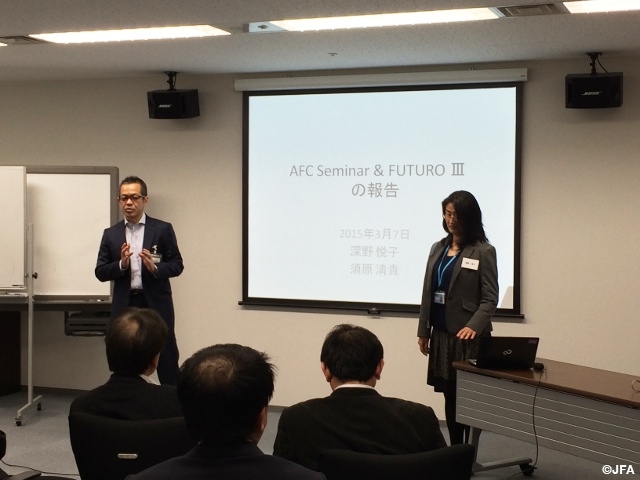NEWS
First training session in 2015 for Class S referee instructors
13 March 2015

The first training sessions in 2015 for Class S referee instructors were held on Saturday 7 March and Sunday 8 March at JFA House. Class S referee instructors are instructors for referees, who get together biannually to attend training sessions.
They learn coaching techniques, so that they can use them in the matches as well as pass them to Class 1 referee instructors.
During this two-day training, SUHARA Kiyotaka and FUKANO Etsuko, who participated in the instructors’ training ‘FUTUROⅢ’ hosted by FIFA last year, reported on the FIFA coaching scheme. Then the participants tried to use the coaching skills, which they had started using last year, in practice. ISHIYAMA Noboru, the JFA top referee instructor, reviewed what they learned from Edward Wolstenholme, who was invited from the English FA last summer. They also prepared a presentation about how to improve refereeing, using the video of an actual current JFL referee’s performance. They divided into groups to do some mock-training, so that they could review the technical points for coaching.

Comments
OBATA Shinichiro(JFA Referee Committee Vice Chairman / Referee Committee Coaching Section Chairman)
The aim of Class S referee instructors is to improve the performance of other referees, always thinking about and putting into practice what they can do, and when and how they should do it. The referee instructors regularly participate in training courses to learn and practice the guiding ideas and techniques, so that other referees themselves can notice, learn or try out things. By working with other referees, they can gain more energy. I designed this training course to try out the coaching scheme, which they have learned so far, and the coaching theories in practice.
The participating Class S referee instructors showed a flexibility of thought and enthusiastic coaching, which made the meaning and necessity of coaching very clear. I believe they could learn various coaching methods, including especially the approach to refereeing, the way to face referees' tasks, thinking about ‘why’, making referees notice their characters, and making them eager to solve problems. It allows them to put the coaching theory into practice, making the coaching like ‘a dramatic story’. I’d like to continue helping referees, so that they can be independent.
YAMAZAKI Yasuhiko(Class S Referee Instructor)
Under the theme of ‘a dramatic story’, we learned about ‘practical coaching for the referees’ just like last year. I was looking forward to learning a coaching method that would increase self-affirmation, as I had heard about it before.
We started reviewing what we learned from the lecture, ‘Coaching’, given by Edward, who came from England last year, and we shared our understanding of the words describing coaching style. Then we considered how to put these into practice, and prepared a presentation, using the video. We finished with trying the mock-training in groups. Our aim was to help the referees’ self-actualisation and make them realise their characters and areas for improvement. We need to support them, so that they become eager to face their problems. I shared the importance of systematic coaching, including creating a good atmosphere and continuous involvement. I’d like to improve myself bearing in mind what I learned, not to mention making the referees improve. I’d also like to bring what I learned back to my region.
FUKANO Etsuko(Class S Referee Instructor)
It was my first training session after becoming a Class S referee instructor this year. We, Class S referee instructors, have two missions – to support the referees and to support the referee instructors. Although they are different roles, motivating them is the same thing, and making them improve even more. During the training sessions, I was asked to do some tasks, which usually I don’t try. I was very impressed with the feedback I got from other referee instructors, not to mention with the tasks themselves. I was pleased when I got some positive feedback, while accepting things, which needed to be improved. I learned again that I myself have to do the same thing with the referees.
I saw the light by having my strengths pointed out, which I have never though of. I’d like to improve my analytical ability in order to give feedback accurately. During the course, I worked on tasks under the theme of coaching. Personally, it was knowledge, which I already knew. However, it was a great opportunity to know about other instructors’ coaching. Usually, as we are individually sent to each match, we haven’t got an opportunity to see how others do things. I’d like to learn from others.
It reminded me of the phrase by Roger Lemerre, the former head coach of the France national team - ‘When you stop learning, you stop teaching.’ I have renewed my resolve to improve the referees and the referee instructors, as well as help developing Japan’s football, through continuous learning.
Latest News
-
National Teams
2026/02/19
U-20 Japan Women's National Team short-listed squad & schedule - Training Camp (2/23-26@JFA YUME Field)

-
National Teams
2026/02/19
Japan Beach Soccer National Team short-listed squad & schedule - Training Camp (2/26-3/2@Okinawa)

-
National Teams
2026/02/12
U-17 Japan National Team squad & schedule - Prayer for Peace; Hiroshima International Youth Soccer Games 2025 (2/17-23@Hiroshima)

-
National Teams
2026/02/12
Nadeshiko Japan (Japan Women's National Team) squad & schedule - AFC Women's Asian Cup™ Australia 2026 (2/23-3/22)

-
National Teams
2026/02/09
U-16 Japan Women's National Team short-listed squad & schedule - Training Camp (2/16-19@Okayama)




